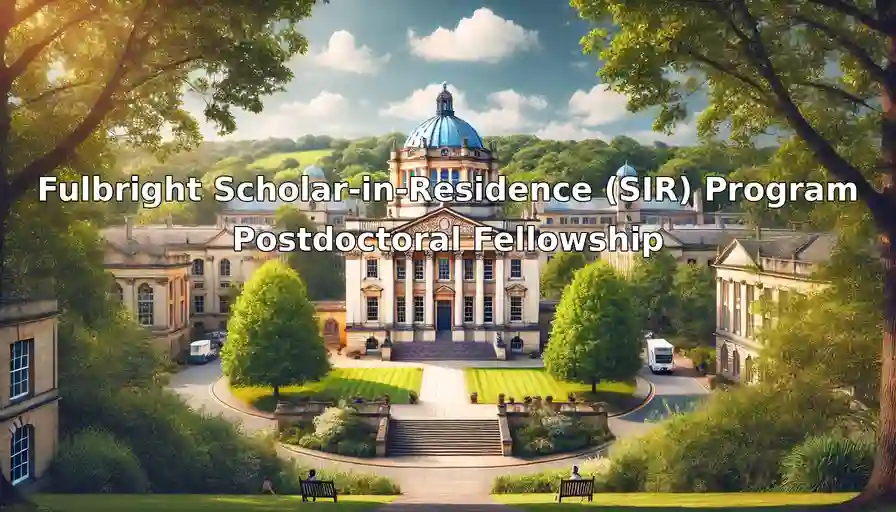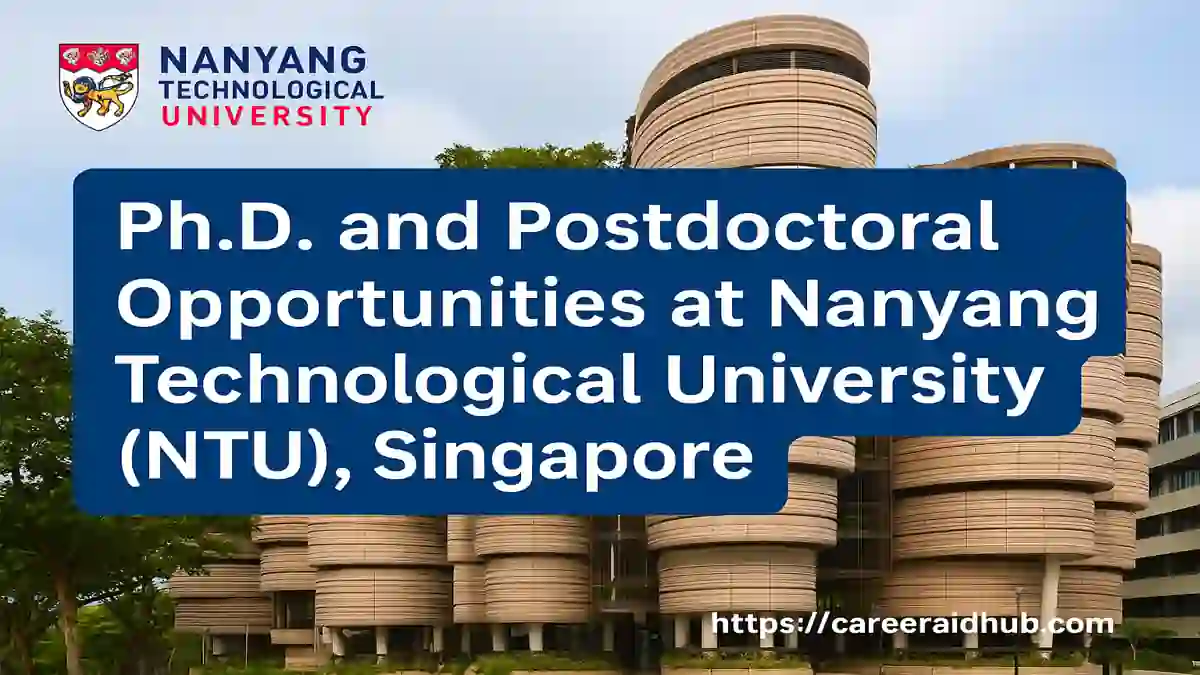Fulbright Scholar-in-Residence Program 2026–2027: Fully Funded U.S. Teaching & Research Opportunity
The Fulbright Scholar-in-Residence (S-I-R) Program for 2026–2027 provides a prestigious opportunity for international scholars to teach and conduct research at higher education institutions in the United States. This fully funded program is designed to enhance mutual understanding between the United States and other nations by inviting scholars to U.S. campuses for either a semester or an entire academic year.
Ideal for early-career researchers, seasoned academics, and professionals seeking international exposure, the S-I-R Program offers comprehensive financial support, professional development opportunities, and rich cultural exchange experiences. Participants contribute to curriculum development, deliver guest lectures, and engage in community-oriented activities that enrich the academic environment of the host institution.
About the Fulbright Scholar-in-Residence (S-I-R) Program
- Program Name: Fulbright Scholar-in-Residence (S-I-R) Program
- Current Status: Accepting applications for the 2026–2027 academic year
- Scope & Objectives: The program aims to internationalize U.S. campuses by hosting scholars who bring global perspectives in both teaching and research. Scholars are expected to contribute to curriculum development, enhance faculty collaboration, and foster community outreach.
- Program Duration: Options include one semester (3–5 months) or a full academic year (6–10 months)
- Study Mode: Full-time, in-person engagement atU.S. institutions
- Focus Areas: Disciplinary fields include humanities, social sciences, sciences, technology, engineering, mathematics, and interdisciplinary studies
Eligibility Criteria
Academic Requirements
- A terminal degree (e.g., Ph.D.) or equivalent professional experience in the proposed field of teaching is required.
Work Experience
- Demonstrated teaching or professional experience relevant to the proposed academic and research activities.
Nationality
- Applicants must hold citizenship in a country other than the United States.
Language Proficiency
- Applicants must demonstrate proficiency in English sufficient to carry out the proposed teaching and research responsibilities.
Additional Requirements
- Applicants should have minimal or no prior experience in the United States.
- Applicants must not be U.S. citizens or permanent residents.
Application Process
- Identify a U.S. Host Institution:
Locate and connect with a U.S. institution that is interested in submitting an application on your behalf. - Develop a Proposal:
Collaborate with the host institution to create a proposal that outlines your teaching responsibilities, curriculum development plans, and community engagement activities. - Submit the Application:
The host institution must submit your application through the official portal: apply.iie.org/sirhost. - Selection andPreparation:
Await the selection results. If chosen, coordinate with the host institution and Fulbright administrators to prepare for the exchange program.
Required Documents
- Curriculum Vitae (CV): A detailed account of your academic and professional history.
- Statement of Purpose: A clear outline of your teaching objectives, research interests, and anticipated contributions.
- Recommendation Letters: A minimum of two letters verifying your qualifications and suitability for the program.
- Academic Transcripts: Certified copies of your academic records.
- Language Proficiency Scores: Valid scores from TOEFL, IELTS, or an equivalent exam, if applicable.
- Passport Copy: A valid identification document.
Focus Areas / Fields of Study
The S-I-R Program supports a broad array of academic disciplines, including but not limited to:
- Humanities and Social Sciences
- Science, Technology, Engineering, and Mathematics (STEM)
- Business and Economics
- Education and Teacher Training
- Environmental Studies
- Public Health
- Interdisciplinary Studies (projects integrating multiple fields are strongly encouraged)
Financial Benefits
The Fulbright Scholar-in-Residence (S-I-R) Program provides comprehensive financial support for selected scholars:
Monthly Stipend
- Low-Cost Living Areas: $2,710 per month
- High-Cost Living Areas: $3,035 per month
- Super High-Cost Living Areas: $3,145 per month
Professional Allowance
- For Grants Longer Than Four Months: $1,125 per month
- For Grants of Four Months or Less: $750 per month
Settling-In
- For Grants Longer Than Four Months: $750 (one-time)
- For Grants of Four Months or Less: $500 (one-time)
Dependent Allowance
- One Dependent: $200 per month
- Two or More Dependents: $350 per month
Travel
- The program covers round-trip international airfare for the scholar.
Medical Insurance
- The scholar will receive accident and sickness coverage.
Note: Host institutions may offer additional support (e.g., housing or meal plans) based on available resources and existing agreements.
Selection Process
The selection process for the S-I-R Program involves several stages:
- Application Review:
U.S. host institutions initially submit applications that detail the proposed scholar’s role and contributions. - Peer Review:
Submitted applications are evaluated by academic peers to assess the candidate’s qualifications and the program’s alignment with Fulbright objectives. - Committee Review:
A selection committee reviews applications, considering factors such as:- Academic and professional qualifications
- Potential to enhance international understanding
- Alignment with the host institution’s goals
- Contribution to diversity and inclusion
- Final Selection:
The Fulbright Foreign Scholarship Board makes the final decision, after which selected scholars arenotified.
Key Application Deadlines
For the 2026–2027 cycle, the application timeline is as follows:
- Application Open Date: February 2025
- Application Deadline: June 3, 2025, at 5:00 PM EST
- Notification of Selection: October–November 2025
- Program Start Date: August–September 2026 (aligned with the U.S. academic calendar)
Note: Specific dates may vary. Applicants should consult the official Fulbright S-I-R Program website for the most current information.
Tips to Strengthen Your Application
- Statement of Purpose: Clearly articulate your objectives, detailing how you plan to contribute to the host institution and how the program aligns with your career aspirations.
- Curriculum Vitae (CV): Emphasize relevant academic and professional experiences, including publications and previous international engagements.
- Recommendation Letters: Select referees who can convincingly speak to your teaching abilities, adaptability, and potential for contributing to cross-cultural understanding.
- Engagement Plan: Include proposals for activities beyond traditional teaching, such as community outreach or collaborative research, to showcase a comprehensive engagement strategy.
Contact Information
- Program Coordinator: Fulbright S-I-R Program Team
- Email: [email protected]
- Phone: +1-212-984-5330
Conclusion
The Fulbright Scholar-in-Residence Program offers a unique platform for international scholars to engage with U.S. academic communities, enhance educational curricula, and foster mutual understanding between cultures. With its comprehensive financial support and emphasis on cultural exchange, this program serves as a valuable opportunity for professionals looking to expand their global impact.
Prospective applicants are encouraged to begin the application process by visiting the official website and preparing their materials accordingly.
Quick Summary Table
|
Feature |
Details |
|
Program Name |
Fulbright Scholar-in-Residence (S-I-R) Program |
|
Host Country / Region |
United States |
|
Funded By |
U.S. Department of State, Bureau of Educational and Cultural Affairs |
|
Eligibility |
Foreign scholars with relevant academic or professional experience |
|
Financial Support |
Monthly stipend, travel, settling-in allowance, professional allowance |
|
Fields of Study |
Various disciplines across humanities, sciences, and more |
|
Application Deadline |
June 3, 2025, at 5:00 PM EST |
|
Official Website |
Citations
- Fulbright Scholar-in-Residence Program. Available at: https://fulbrightscholars.org/sir
- Fulbright U.S. Scholar Application Instructions. Available at: https://fulbrightscholars.org/us-scholar-awards/application-instructions
Frequently asked questions
The Fulbright S-I-R Program enables U.S. institutions to host international scholars for teaching and cultural exchange during a semester or full academic year
Non-U.S. citizens with academic or professional expertise, nominated by a U.S. institution, are eligible to participate in the S-I-R Program.
International scholars cannot apply directly; a U.S. institution must submit an application to host the scholar.
Scholars receive a monthly stipend, travel allowance, settling-in allowance, professional allowance, and accident and sickness health benefits.
The application deadline for U.S. institutions to host a scholar is June 2, 2025, at 5:00 PM EST.
The program supports a wide range of disciplines, including humanities, social sciences, sciences, technology, engineering, mathematics, and interdisciplinary studies.
Yes, scholars can teach up to two courses per semester during their residency.
No, in fact, preference is given to scholars with limited or no prior experience in the United States.
The program duration is either one semester (3–5 months) or a full academic year (6–10 months), depending on the host institution’s proposal.
Premium Mentorship for a Stronger Application
- Premium Mentorship: personalised 1:1 guidance for this and similar opportunities
- In-depth review of your CV, academic profile, and key statements
- Aligned with international selection criteria so your profile matches what panels expect
- Stronger, more compelling narrative for highly competitive calls
- Step-by-step support from opportunity mapping to final submission (fee-based)










